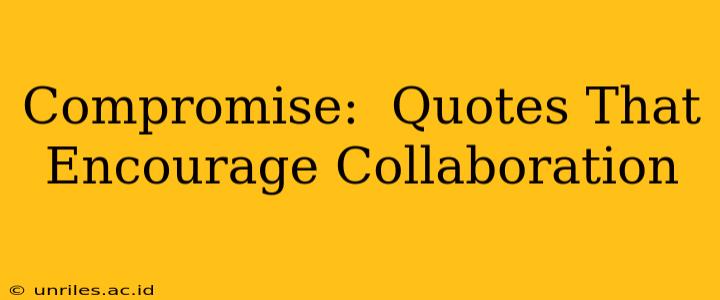Compromise. The very word can evoke feelings of defeat or resentment. Yet, in the collaborative world we inhabit, it’s a crucial skill, a bridge between differing perspectives, and the cornerstone of successful teamwork. This isn't about surrendering your ideals; it's about finding creative solutions that satisfy multiple needs. This article explores the power of compromise through insightful quotes and examines how embracing this skill fosters a more productive and harmonious environment.
What is Compromise in Collaboration?
Before diving into the inspiring words of wisdom, let's define what compromise truly means in a collaborative setting. It's not about conceding everything to appease others. Instead, it involves a thoughtful negotiation process where each party involved actively listens, understands differing viewpoints, and works towards a mutually acceptable solution. This often requires flexibility, empathy, and a willingness to adjust one's initial position to achieve a shared goal. The key is to find a solution that, while not perfect for everyone, works well enough for everyone involved to move forward.
Inspirational Quotes on Compromise and Collaboration
Many brilliant minds have recognized the importance of compromise. Their words offer guidance and encouragement in navigating the sometimes-challenging path towards collaborative success.
"The best compromise is the one that leaves both parties feeling they’ve won something." – Unknown
This quote beautifully captures the essence of a successful compromise. It’s not about a zero-sum game where one person loses and the other wins. Instead, it emphasizes a win-win scenario, fostering a sense of shared achievement and strengthening the collaborative bond.
"The only way to do great work is to love what you do. If you haven’t found it yet, keep looking. Don’t settle." – Steve Jobs
While not directly about compromise, this quote from Steve Jobs highlights the importance of finding solutions you believe in. Compromise doesn't mean sacrificing your values; it means finding a way to integrate them into a broader, collaborative vision.
"Progress is impossible without change, and those who cannot change their minds cannot change anything." – George Bernard Shaw
This underscores the flexibility and open-mindedness necessary for effective compromise. Being rigid in your position can hinder progress, while embracing change and adapting your approach demonstrates a commitment to collaborative success.
How to Effectively Use Compromise in Your Team
Compromise is a skill that can be learned and improved. Here are some key strategies:
- Active Listening: Truly understand the perspectives and needs of others. Ask clarifying questions and avoid interrupting.
- Empathy: Put yourself in the shoes of your collaborators. Understanding their motivations will help you find solutions that address their concerns.
- Clear Communication: Articulate your needs and preferences clearly and respectfully. This avoids misunderstandings and fosters open dialogue.
- Creative Problem-Solving: Don't limit yourself to obvious solutions. Brainstorm together to explore innovative alternatives.
- Mutual Respect: Maintain a respectful attitude throughout the negotiation process. Even when disagreements arise, focus on finding a solution that respects everyone's contributions.
Addressing Potential Challenges of Compromise
While compromise is crucial for collaboration, it's important to acknowledge potential challenges:
- Unwillingness to Compromise: Some individuals may be resistant to compromise, prioritizing their own needs above the collective goals. This requires careful negotiation and potentially mediation.
- Power Imbalances: Unequal power dynamics can make it difficult to reach a fair compromise. It's crucial to address these imbalances and create a level playing field.
- Compromise Fatigue: Constant compromising can lead to burnout and a sense of frustration. It's important to maintain a balance and prioritize self-care.
Frequently Asked Questions (FAQs)
What are the benefits of compromise in the workplace?
Compromise fosters a more positive and collaborative work environment. It leads to improved teamwork, stronger relationships, increased productivity, and better problem-solving. It also demonstrates respect for diverse perspectives, creating a more inclusive and equitable workplace.
How can I overcome resistance to compromise?
Firstly, try to understand the reasons behind the resistance. Is it fear, distrust, or a misunderstanding? Active listening and clear communication are crucial. Framing compromise as a win-win situation, rather than a loss, can also be effective. In some cases, mediation from a neutral third party may be necessary.
Is compromise always the best solution?
No, compromise isn't always the best solution. In some cases, sticking to your principles and refusing to compromise is essential, particularly when ethical or safety concerns are at stake. It's about finding the balance between collaboration and maintaining integrity.
In conclusion, compromise is not a sign of weakness, but a testament to the ability to work effectively with others. By embracing the spirit of collaboration and using these strategies, you can unlock the true potential of teamwork and achieve remarkable success.

